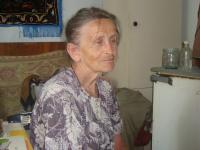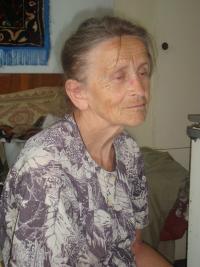We arrived at the border but they turned us back because my dad was Ukrainian

Download image
Nina Luc, née Sidorkevič, was born February 9, 1940 in the village Mirohošť in Volhynia in the then Soviet Union. Mirohošť was a Czech-Ukrainian village and the Sidorkevič family shared the same heritage. Nina’s father was Ukrainian and her mother was Czech. She had younger brother Josef. In 1947 when the re-emigration of Volhynian Czechs to Czechoslovakia was being prepared, the Sidorkevič family wished to leave as well. They were already at the Czechoslovak border, but due to her father’s nationality they were forbidden to re-emigrate to Czechoslovakia. Nina thus studied a ten-year school in Mirohošť and then she attended a teachers’ school in Dubno. She worked as a teacher in Police and later she taught in Rivno. She married an immigrant from Poland. At present she lives in Mirohošť and in Rivno.

